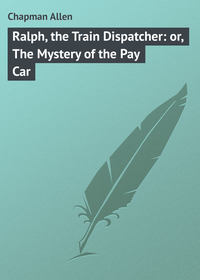 полная версия
полная версияTom Fairfield at Sea: or, The Wreck of the Silver Star
Though the sadness of Tom’s leaving was felt there could not be all gloom and sadness where so many congenial spirits were gathered together. Tom was toasted again and again, and the best of wishes were expressed in his behalf. He made a brief address, and said he hoped he’d meet them all again soon.
“For He’s a Jolly Good Fellow!” some one started, and it was loudly sung. And the odd part of it was that no one came to break up the little gathering.
True a monitor did hear the unusual and forbidden noise in the rooms, but, being both wise and sympathetic, he said nothing, and no report reached the proctor. Demosthenes Miller, the studious janitor, was a guest at the farewell supper, and made a speech in what he said was Latin, but – well, he is such a good chap, and was such a friend to the students, that I’m not going to say anything unpleasant about him.
And so, after all, in spite of Tom’s sad heart, he could not help feeling a little better as he was a witness to the love of his classmates.
“Well, it’s good-bye, old man!” exclaimed Jack a bit solemnly the next morning, as the time for parting came. Several others, deeming their farewell of the night before not enough, also came in to shake hands.
“I’ll see you again – some time,” faltered Tom.
He went to bid good-bye to Doctor Meredith, and his own particular professors, and then hurried on to the station, with Jack Fitch as his only companion.
They parted with a handshake, and with moist eyes, and lumps in their throats.
“Good – good luck!” stammered Jack.
“Thanks,” murmured Tom, and then his train pulled out, and Tom had started on his long journey.
A week later found him in San Francisco, the trip across the continent having been without special incident. He had stopped in New York, to see Jack’s father, and Mr. Fitch had given him some good advice, and letters to his agent in Sydney.
“And now to hunt for a ship that will take me where I want to go,” mused Tom, as he left his baggage at a hotel and started for the waterfront.
Tom was well supplied with money, and had drafts and letters of credit for a larger amount. His father had left funds in his name in their local bank on leaving for Australia, and also instructions with his business partner to supply Tom with as much cash as was necessary in case of emergency.
The news of the possible loss of the Kangaroo was held by Mr. Fairfield’s partner to be an emergency, and Tom had drawn on the reserve account.
Following the advice of Mr. Fitch, Tom sought out a certain San Francisco steamship agency and told of his needs.
“Hum,” mused the manager when Tom had given the longitude and latitude where the wreckage had been sighted. “That’s in the vicinity of the Eastern Group of the Friendly Islands, as near as I can make out,” and he consulted a chart. “We don’t have many vessels hitting just at that particular spot in the ocean. Still – hum – let me see.”
He looked over a sailing list, made some notes, looked again at the chart and announced:
“Well, I guess the Silver Star would about hit what you want. She’s not a very large steamer, but she’s comparatively new, and a good safe boat. Captain’s nice man, too. She doesn’t carry many passengers, but her berths are not all filled, and I guess they can make room for you. If you want to stand the expense I can arrange to have the captain cruise about in the vicinity of those islands for a day or so.”
“I’ll stand the expense!” cried Tom eagerly. “We may sight something!”
“All right. Then I’ll draw up the papers. The Silver Star sails in six days from now.”
Those six days Tom spent in San Francisco, seeing the sights of the place, and fretting and worrying that time did not pass faster.
Tom made the acquaintance of Captain Amos Steerit, the master of the Silver Star, and at once took a liking to him. Our hero went on board several times, when the steamer was loading at her wharf, and made friends with some of the crew.
At last sailing day came, and the bustle and confusion that had been going on for some time seemed redoubled. But there was a certain order about the proceedings, and at last everything had been done.
“I wonder if that fellow is ever coming?” murmured the captain, as he stood on the bridge, waiting to give the word to cast off.
“Who?” asked Tom, as he stood beside the skipper, for being a sort of privileged character, our hero was allowed certain liberties.
“Oh, a passenger who is going to Honolulu, and who engaged a berth by wire. He said he couldn’t come on board until the last minute, but it’s past that now. Ah, maybe this is he coming now.”
Down the wharf came a rather stout man, followed by a stevedore carrying a steamer trunk. There was a certain familiar air about the approaching figure, and Tom found himself wondering where he had seen the man before. The glimpse of the face he had, however, was not enlightening, and our hero soon turned his attention elsewhere, for the getting of the ship under way was somewhat of a novelty to him.
“Well, you finally got here, I see,” half growled the captain from the bridge, as the belated passenger came on board.
“Yes, I – that is I – well, I came as soon as I could,” said the man, pantingly.
Tom wheeled at the sound of the voice, but he had no chance for a close inspection of the man’s face. For, no sooner had our hero shown his curiosity, than the passenger turned, and fairly ran toward the berth deck, at the same time calling:
“See you later, captain! I have forgotten something.”
“Well, it’s too late now, if it’s got anything to do with going ashore!” cried the commander. “Haul in that gang plank there!” and he swung the engine room telegraph lever over to half speed ahead. The Silver Star began slowly to leave her dock, while Tom found himself wondering who the mysterious passenger could be.
“But it doesn’t concern me,” he mused. “I’ve got enough other troubles.”
If Tom had only known, though, the belated passenger did concern him, and vitally, too.
CHAPTER IV
A PUZZLED CAPTAIN
Amid a confusing sound of tooting whistles, the clanging of bells, hoarse commands shouted back and forth, the Silver Star made her way through the shipping of the harbor, and pointed her nose toward the mysterious Pacific – the ocean that held so many strange lands and islands, – the ocean on whose broad bosom perhaps, Tom’s father and mother were drifting helplessly about, in a wreck. Or mayhap they lay beneath the waves.
But Tom did not dare dwell on that terrible possibility and, for the time being, he resolutely put all thoughts of never seeing his parents again, out of his mind.
“I’m just going to find them!” he cried bravely, though he knew he had a hard task ahead of him.
But just now the busy scenes that were taking place, as the steamer started off on her voyage, held his attention, and for a moment he even forgot the mysterious passenger who had gone to his cabin in such a hurry.
“Well, Tom, my boy!” exclaimed Captain Steerit, as he looked at our hero, “we’ve got good clean weather to start off with, and, if I’m any judge, it will hold for some time.”
“It isn’t so rough on the Pacific as it is on the Atlantic; is it?” asked Tom. “At least I’ve read so, and the name – ”
“Don’t get that idea into your head,” laughed the commander. “The Pacific is peaceful in name only. Of course I don’t mean to say that it isn’t calm a good bit of the time, at certain seasons of the year, just as the Atlantic is. But when it wants to kick up a fuss it can make a bigger one than that ocean you’ve got back east there.
“Yes, when we get a storm out here, we certainly get a bad one. But I’m not looking for trouble. We’re going to point our nose into the nicest part of the ocean, to my thinking. You’ll enjoy it, even if you have a hard trick at the wheel ahead of you. There’ll be lots to see, especially if you go all the way to Australia with me.”
“Well, I expect to go there,” answered Tom, “for I haven’t much hope of sighting anything near the place where the wreckage was seen.”
“Nor I, either,” spoke the captain, “though I didn’t want to discourage you. The drift of the current, and the wind, wouldn’t let anything stay in one place long.”
“Then I’ll just have to go on to Sydney and start my search from there,” ventured our hero earnestly.
“Well, yes, I suppose so, though of course there’s a bare possibility that we may sight something on our way out.”
“What do you mean?” asked Tom quickly, a new hope springing up in his heart.
“I mean that the Kangaroo, from all accounts, was coming over about the same path in the ocean as we’ll take going out. She was to stop at Honolulu I see by the papers, just as we are. Of course she was wrecked – or at least we’ll suppose so – before she got there. And if we sail over the same course we may sight her – or what’s left of her.
“Mind though!” the captain went on quickly, as he saw the look of despair on Tom’s face, “I’m not admitting that she was wrecked. Just as you have told me, I believe that she may have been disabled in a storm, and part of her gear, her masts and her lifeboats, may have been swept overboard. That has often happened. In fact it’s happened to me when I had charge of a big sailing ship.
“But it’s possible to rig up a jury mast, make some sort of sail, and stagger on, when by all accounts one ought to be at the bottom of the sea. So you see it doesn’t do to give up hope.”
“And I’ll not!” cried Tom. “Oh, I do hope we can pick up the Kangaroo. I’m going to keep a lookout every day.”
“Yes, you can do that,” agreed the captain. “I’ll let you take a good glass, and I’ll also instruct the lookout to keep his eyes peeled day and night. But it’s too soon to begin yet, so you might as well take it as easy as you can. Say, did you notice the passenger who came aboard in such a hurry?”
“Yes,” answered Tom, for the ship was now well on her way and there was less of interest to hold our hero’s attention.
“Did you think he acted in any way funny?”
“Well, yes, I did,” admitted Tom. “He didn’t seem to know exactly what to do.”
“And another thing,” went on the captain. “It seemed to me that the sight of you scared him.”
“Nonsense!” exclaimed Tom, though he was aware that the captain was eyeing him sharply. “Why should he be disturbed on account of me?”
“I can’t say, I’m sure. Did you ever see him before?”
“Not that I know of,” replied Tom. “Though when I heard his voice it sounded like some one I’d heard before, though I couldn’t be quite sure, and just now I couldn’t even place the voice.”
“Well, perhaps I’m mistaken,” admitted the captain. “No matter. Have you got your stateroom in shape?”
“Yes, but I guess I can put a few finishing touches on it. I’ve been so interested in watching our start that I haven’t been below much.”
“Well, I’m going down to get something to eat,” went on the commander with a smile, “and if you’d like to come along I can offer you a meal,” for he had arranged that Tom should sit at his table.
“I will!” exclaimed the lad. “This sea air makes me hungry.”
“I thought it would,” responded the commander, with a laugh. “Keep her on this course, Mr. Merton,” he said to the first mate, who had come up on the bridge, at a signal, to take charge of the wheel.
“I wonder if I ought to knock on his door and ask him if he’s hungry?” spoke the captain, half aloud, as he and Tom went below.
“Who?” inquired our hero, though the question was not exactly addressed to him.
“That passenger I was speaking of – Mr. Pierson Trendell his name is – the one who came on board late. He was recommended to my care by a friend of one of the owners of this steamer, though I don’t know him personally. He’s going to Honolulu for his health I understand. Guess I’ll have to be decent to him, though I didn’t take much of a notion to him, and I don’t like anyone who can’t arrive on time.
“But I’ll take a chance, and ask him to come with us and have a little lunch. As you say, this sea air does give one an appetite.”
They were on the berth deck now – the deck where Tom’s stateroom, an outside one, was located. The captain turned into a passageway, and paused before the door of a room not far from our hero’s.
“This is his berth,” he remarked as he rapped on the panel.
“Who’s there?” came a quick demand.
“Captain Steerit,” was the reply. “Would you like to come to lunch with me, Mr. Trendell?”
“In a private room?” was the query.
“No, but at my private table.”
“Any one else?”
“Humph! You’re mighty particular,” murmured the commander. “Why, yes,” he made answer in a louder tone. “My friend, Tom Fairfield, is coming with us. Shall I have a place laid for you?”
“No, thank you – er – that is, I’m not feeling very well. The motion of the boat, you know – in fact I haven’t quite got my sea legs on. Some other time, Captain.”
“Oh, very well, just as you like,” and with rather a frown of annoyance the captain passed on.
“Very strange,” he murmured, half to himself, but loud enough for Tom to hear. “They said he was an experienced sailor, and had been in all sorts of rough blows. And yet he’s seasick when the water is as calm as a millpond. I can’t understand it,” and the puzzled captain shook his head.
“Can a person get seasick more than once?” asked our hero, rather anxious on his own account.
“Oh, yes, there are lots of such cases. And again there are some who never suffer from it. It’s all a matter of nerves, I think. It never bothers me, and yet I had a first mate once, who was always very sick the first two days out, and then he’d be as steady on his legs as a sea lawyer. But every new voyage it would be the same way. But come in to lunch now,” and he led the way to a private table, where Tom was soon putting away a substantial meal that was more like dinner than luncheon.
There was only a slight motion to the Silver Star now, hardly any more than to Tom’s motorboat when he had been out in a blow, and he was beginning to feel that he would not suffer from seasickness.
Captain Steerit left him to his own devices after the meal, for the commander had many things to look after. Tom went to his own stateroom, which he put in shipshape. Then he went on deck again.
The Golden Gate was fading from sight now, and the routine of a vessel out at sea was well under way. Tom saw several passengers, but the man he had begun to classify as the “mysterious one,” did not appear.
“If he’s going to be seasick now’s his chance,” mused Tom, for there was now quite a decided roll to the ship.
But it did not bother our hero, who was feeling in excellent health. Of course he could not help worrying about his father and mother, but he looked on the brightest side, and made up his mind that if there was any possibility of rescuing them he would do so.
It was coming on toward evening, and Tom was wondering how he would sleep on his first night at sea. As he passed near the bridge, on the upper deck, he saw Captain Steerit and the first mate in conversation.
“I can’t understand it,” the commander was saying. “He comes on board as a man who is traveling for his health, and who wants to get all the sea air he can. Yet when I give him an outside stateroom, near young Fairfield’s, he goes and changes it before I know it. He won’t come out to lunch, and now you tell me he asks to have all his meals served in his cabin.”
“That’s it,” said the mate. “He sent the steward to ask me, and I thought it best to speak to you.”
“Quite right. Well, I suppose we’ll have to let him have his way, but I can’t understand it. He wants fresh air, but he won’t come out and get it,” and the captain filled his lungs with the salty, ocean breeze. “Very puzzling! Very puzzling!”
CHAPTER V
THE WATERSPOUT
“That mysterious man – they’re speaking of him,” said Tom softly, as he turned away. “I’m glad, after all, that he did not keep the stateroom near mine. There may be no harm in him, and he may be all right, but he certainly acts queer, and I don’t want to have anything to do with him.”
Tom retired that night, rocked by the gentle motion of the ship. He knew, now, that he was not going to be seasick in ordinary weather, though he realized that he still had to undergo the test of a storm.
“I wonder what it’s like?” he mused. “There very likely will be big waves and a powerful wind. But I hope we don’t have one. I want to make a quick voyage, and a storm would delay us.”
Then he thought of the storm that had wrecked the Kangaroo and this brought the possible fate of his father and mother to his mind. He took out, and read over again, for perhaps the fiftieth time, the clipping from the newspaper that had given him his first hint of the bad news. There were one or two other clippings from other papers, telling the same story, and a later one, confirming the first dispatch.
“Poor dad and mother!” sighed our hero. “I’m coming to you as fast as I can. Oh! if only there was some way of reaching you by wireless! But, even if the wireless was on their vessel at first,” he mused, “it wouldn’t work after the wreck. I’ll just have to wait.”
He stretched out, but it was some time before he got to sleep, and his thoughts were rather sad as they dwelt on the possible fate of his parents.
“Oh, pshaw!” he finally exclaimed, half aloud. “This won’t do! I’ve got to be more cheerful.” Then he changed his current of thought to the good times he had had at Elmwood Hall, and soon he felt himself dozing off, as he recalled the merry midnight suppers he and his chums had partaken of.
“And when this trip is over I’m going back there, and have some more good times,” he whispered.
Tom went up on the bridge after breakfast, to find Captain Steerit looking critically at the barometer.
“Anything wrong?” asked our hero.
“No, not yet. And yet it has fallen a little. I don’t just like it, but otherwise the weather is good. I don’t see any signs of a storm, so I guess I won’t worry. How did you sleep?”
“Pretty good.”
“Do you mind the motion much?”
“Hardly any.”
“That’s good. I guess we’ll make a sailor of you, after a while. Be around at noon, when we take the observation, and I’ll show you how it’s done.”
“I will,” promised Tom, and then he went around the ship, speaking to some of the sailors and officers whom he knew. He also made the acquaintance of several of the passengers. There was one gentleman, a Mr. Case, who, with his little son, aged about seven years, was making the trip to Australia, where he had a business, near Melbourne. He had come to New York with his wife to settle up some affairs, and the child’s mother had died there.
“And now I’m going back,” the father confided to Tom. “I am going to try and forget my sorrow – forget it in hard work.”
Tom felt a deep sympathy for him, and for the child, and the latter lost no time in making friends with our hero. They had many a romp on deck, and Tom made up a number of games and amusements for the lad.
The promise of uncertain weather given by the barometer was not kept, and the ship slipped along through the water in a succession of calm, sunny days. Tom had almost forgotten about the strange man now.
Mr. Trendell was not seen on deck, keeping carefully to his stateroom, and Tom heard that he was suffering much from seasickness. He felt sorry for the man, as only a person can who does not suffer from the qualms of the boat’s motion.
“Jackie was ill on our trip over,” said Mr. Case, the father of Tom’s little playmate, “but I’m glad to see that he’s well going back. I guess it’s the attention you give him that takes his mind off it. But don’t let him be a bother to you.”
“Oh, I like him!” exclaimed Tom, who was fond of children. “He’s a good sailor; eh, Jackie?”
“Sure,” answered the little chap. “Come on, now, let’s play ring-toss some more,” and Tom complied.
The passengers, of whom there were only about a dozen, had soon made friends with each other – that is all but the “mysterious one,” as Tom still thought of him, – and they all did what they could to make the time pass pleasantly.
Tom’s sad quest became known to all and he received much sympathy, while Mr. Case told stories of shipwrecks in which persons, believed for a long time to be lost, had finally been found. This comforted our hero very much.
“How anyone can remain below on such a night as this I can’t see!” once exclaimed a Mrs. Pendleton, who was taking the trip with her daughter. “Such a lovely moon, and such a calm sea! And yet, I understand, Mr. Fairfield,” she said to Tom, “that there is a gentleman on board who hasn’t yet been out of his stateroom – who takes all his meals there.”
“Yes,” replied Tom. Nearly all the passengers were out on deck that evening, enjoying the calm, peaceful night, and looking at the phosphorescent sea, silvered by the moon. “I don’t know why he stays below unless it is that he is very ill.”
“Perhaps no one has invited him out,” suggested Mrs. Pendleton, who was quite impulsive. “Let’s go, you and I, Mr. Fairfield.”
“Oh, no, mamma!” exclaimed her daughter. “Perhaps he has good reasons for being quiet. It is none of our affair.”
“But we ought to make it our affair to see that he enjoys the best part of the trip,” insisted her mother. “I’m going to get him out.”
“No, you must not!” her daughter insisted. “Oh, mamma, you do the strangest things!” and she laughed. “I have to be watching her all the while,” she added with a laugh, to the others. “She has no regard for conventionality.”
“There’s no sense in it,” insisted the elder lady. “But I’ll not go if you don’t want me to. There, a big fish just jumped up!” she exclaimed, as there came a splash in the water.
They all crowded to the rail to look, Jackie Case, who had not yet gone to bed, being the most eager.
“Where’s the big fish?” he cried. There was quite a swell on, and the boat rolled from side to side at times with a dangerous pitch, but not annoying to those used to it. It was just on one of the occasions when the ship slid along, tilting her rail, with the passengers up against it toward the waves, that little Jackie tried to climb up to the highest point of vantage.
“I don’t see the fish!” he cried, and he leaned over still farther. In another instant he had overbalanced, and, with a cry of terror, he had slipped across the rail.
“There he goes!” cried Mrs. Pendleton. “Jackie has fallen!”
His father came rushing up with a cry of anguish. But Tom had been near enough to make a grab for the little chap, and he hung fast. Now a voice rang out:
“Man overboard!”
“Man overboard!” repeated the lookout. “Lower the boat!”
There was a clanging of bells in the engine room, as the propeller was reversed.
“Hold tight, Jackie!” cried Tom, as he tried to get the little fellow back over the rail. “I’ll help you. Hold tight!”
But the little boy was too frightened to aid himself and he let go. But now our hero had a better hold and he clung on desperately, until others came to his assistance, and then both were helped to a place of safety. Tom had gotten pretty wet, but this he did not mind.
“Oh, Jackie! Jackie, my boy!” cried Mr. Case, hugging the little form to him, and then, still clasping his son, the man held out his hand to Tom.
“I – I can’t thank you now,” he said brokenly, “but I may be able to – sometime.”
The accident broke up the pleasant little party on deck, and Tom hurried below to change to dry garments. As he passed the stateroom of the mysterious man our hero saw that one of the stewards was speaking through the partly-opened door to Mr. Trendell.
“It’s all over now,” the steward was saying. “A little boy almost fell overboard, and Tom Fairfield went after him.”
“Was either recovered? Was Tom Fairfield drowned?” asked the voice of the man in the stateroom.
“No, sir. They were both saved. Thank you!” This last obviously in response to a tip handed out. The door was closed and Tom passed on.
“Queer,” he mused, as he reached his stateroom, “very queer that he should want to know if I was drowned.”
Neither our hero nor little Jackie was any the worse off the next morning for the accident. Tom’s heroism was the talk of the ship.









